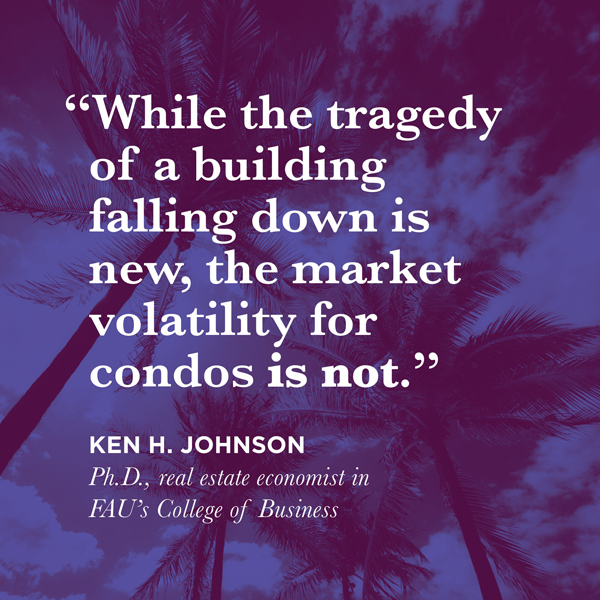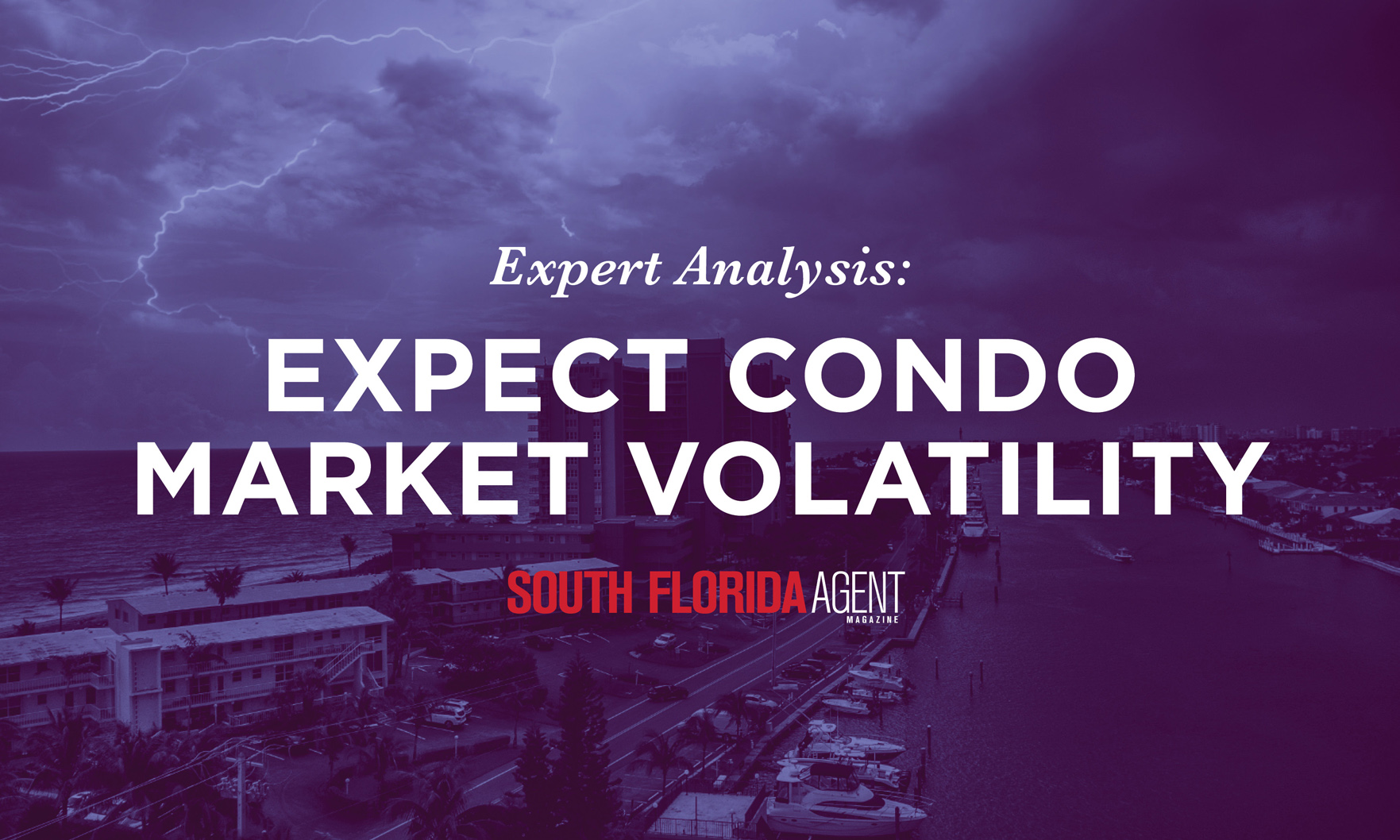The Champlain Towers South collapse emergency is ongoing, and some experts say they expect condo sales, in what was a roaring condo market in Miami, to struggle from the impact. What can agents, sellers and buyers anticipate?

Eric Glazer, attorney and founder of Glazer and Sachs, specializing in condominium and homeowner association law.
“The condo market was on fire,” said Eric Glazer, attorney and founder of Glazer and Sachs, specializing in condominium and homeowner association law, and host of the weekly Condo Craze and HOAs radio show. “There is no question that the condo market is going to take a hit because of the fear factor. I’ve already seen it in closings.”
Condo sales since last year jumped 286% in May from a year ago, where unit sales went from 563 to 2,176, according to the Miami Association of Realtors. Property records show that the Champlain Towers South had a total of 14 units sold over the last three years. It was part of the sales bonanza.
Buyer hesitation has already started. A real estate attorney, who requested anonymity, reported that a scheduled closing at a Bal Harbour condo, the day after the Surfside collapse, was put on hold, even though the building where they were buying is only three years old. The buyers now want a building inspection, the attorney said.
Many scheduled closings on older condo buildings are being delayed, waiting for the mandatory inspections that Miami-Dade County, Miami Beach and all the local barrier island and waterfront government officials have demanded on buildings over four stories high. While they wait, buyers with active contracts can delay their closings, but they can’t walk away from their contracts without losing their deposits.
“You’re going to have more delays from buyers on closing dates,” said Glazer. “Why would you close before you have a building inspection and an acceptable report? This might be a deal-breaker for some clients.”
The New York Times reported that a Miami real estate agent, Cordelia Anderson, said five clients who had been looking at units in older condo buildings on the beach asked for hefty discounts after the collapse, or abandoned the coast and instead wanted to search inland.
Glazer doesn’t expect the impact to the market to last forever, but everything is going to get much more expensive.
“There’s going to be a lot more due diligence involved in a sale,” said Glazer. “No longer is a seller and agent just going to have to disclose issues on just the individual unit. Buyers are going to want to see the latest building repair records, a geologic survey of the foundation and if the condo association has a large enough reserve fund to handle repairs.”
Surprisingly, Florida law only requires disclosure on an individual unit. There is no law that requires disclosure on the common areas of a building or property. With the additional stress oceanfront buildings have from the sun, heat, wind, rain and salt-spray, beating on these structures year after year, the concrete breaks down and leaks and the steel inside the concrete rusts and dissolves inside the walls, balconies, and throughout the property’s infrastructure.
“Miami-Dade and Broward County condominiums are required by law to undergo a 40-year certification process whereby an engineer must attest that the building is structurally safe and electrically safe,” said Glazer. “It would not surprise me if we see a change going forward, reducing the 40-year certification to 30 years or even less. I think engineers are going to be busy.”
Changing the law won’t happen quickly because the Florida Legislature isn’t due to meet again until next year, but Glazer said the Florida Bar Association is already drafting proposals to help with legislation. In addition, Florida law allows condo associations to waive budget reserves each year.
“Condo associations must make sure the property is always safe and sound,” said Glazer. “Too many times you hear about [associations] not being able to afford necessary repairs. Too many times the can is kicked down the road as allowed by law. The reserves are waived for the umpteenth year again and again and again.”
Residents at Champlain Towers South were getting ready for assessments from $80,000 to $200,000 per unit to repair major problems with the building. In total, the repair budget was $15 million, according to an engineering report.
Buyers will now be more sensitive to association fees, which are expected to go up, potential future assessments and checking the financial health of the association. They will be looking more closely at the construction of the building. This will lead to higher prices and discourage some buyers, say experts.
The median sales price of existing condos in Miami-Dade rose to $325,000, a 25% year-over-year increase as of May. That price includes many older waterfront buildings, which increased 475.4%.
The Miami Herald reported that buildings located near the collapse site may be most affected. Ana Bozovic, founder of brokerage and consulting firm Analytics Miami, in an interview with the Herald, said resale prices might drop for the ultra-luxury Eighty Seven Park, which is adjacent to the site of the collapse and currently has seven units for sale priced between $2 million and $11 million. She says condos in the town of Surfside may be hard hit for the next year, especially older buildings.
According to the real estate firm Condovulturesrealty.com, 1,660 units in buildings on the barrier islands built before 2000, before Florida’s building code was toughened to its current standard, currently are listed for sale, with an average price per unit of $589,692. During the first three months of 2021, 779 sales were closed at an average price of $487,384. Currently 491 units are under contract at an average price of $484,821.
In comparison, the current 1,241 active listings of condos in buildings on the barrier islands built after 2000 have an average listing price of $3,141,845.
At Champlain Towers South, six days before the collapse, a three-bedroom, ninth-floor condo with ocean views closed for $710,000. A 4,500-square-foot penthouse closed for $2.8 million a month ago.
In the hot condo market, Champlain Towers South experienced a notable 2021 with eight condos sold. Most sold for more than double the purchase price. A 1,683-square-foot condo sold for $800,000 in February, more than doubling its 2012 sale price of $370,000.
The age of the building didn’t stop buyers. One couple bought a two-bedroom apartment for $750,000 in 2020 even though the unit’s balcony had a cracked slab. The couple was told that the building was going through a 40-year inspection, an expensive building renovation, and the buyers agreed to pay $112,000 for the assessment fee. Fortunately, the couple was not in the building when it collapsed.
 Surfside’s real estate value is already starting to turn. Realtors are reporting that potential buyers have cancelled showings. And with more buildings being evacuated because of structural issues that have been found during the latest emergency inspections, the near-term outlook isn’t promising.
Surfside’s real estate value is already starting to turn. Realtors are reporting that potential buyers have cancelled showings. And with more buildings being evacuated because of structural issues that have been found during the latest emergency inspections, the near-term outlook isn’t promising.
“Condos have always been volatile,” said Ken H. Johnson, Ph.D., a real estate economist in FAU’s College of Business. “They are the canary in the coal-mine for the real estate market. While the tragedy of a building falling down is new, the market volatility for condos is not. We don’t have specific research on something like this, but after hurricanes and other market pressures like recessions, there are going to be price impacts. It will probably last a year or two.”

Ken H. Johnson, Ph.D., real estate economist, FAU College of Business
Johnson added that now is the time for brokers to take on a consulting role and meet with condo boards to help them through this crisis with their owners. Brokers can help by giving them good guidance, to encourage the boards to get deferred maintenance completed, build up reserves, get ahead of their 40-year certifications and more.
“A property that has everything up-to-date and in good shape will weather this crisis better than the others that have been kicking the can down the road for years,” said Johnson.
In the meantime, according to Glazer, agents need to be careful. “If during the sales process they gain knowledge of something wrong with the building or common areas at a property, especially if they are asked if there are problems at the property, they must disclose it. If the agent doesn’t, they are exposing themselves to be sued for fraud,” he said.

